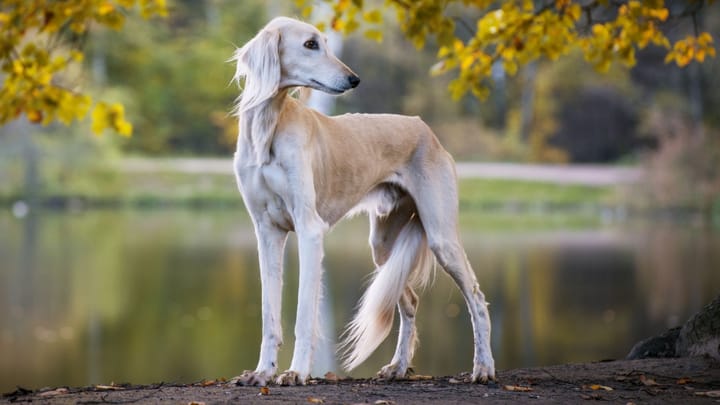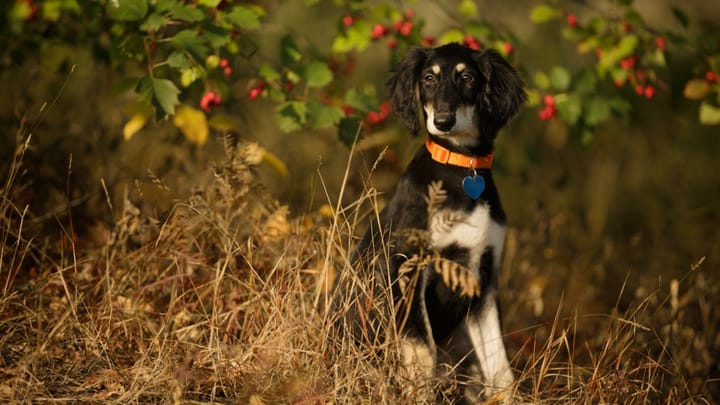Saluki
Other name: Persian Greyhound


The Saluki is such a graceful canine, with strength, endurance and great speed capabilities. Because of these characteristics, it is a great hunter, skilful at chase, hunt and kill any prey over many terrains. Individual features vary in each dog, but all Salukis have a greyhound-like appearance, with a deep chest and narrow body, slender, long legs, a tiny waist and a long tail. The deep eyes of the dog have a faithful, soul-searching look. Overall, the Saluki is a dignified, gentle breed.
|
Life expectancy |
The Saluki has a life expectancy of between 12 and 14 years |
|
Temperament |
|
|
Size |
Medium
|
|
Adult size |
Female
Between 23 and 28 in
Male
Between 23 and 28 in
|
|
Adult weight |
Female
Between 33 and 55 lb
Male
Between 33 and 55 lb
|
|
Coat colour
White, grizzle, red, golden, fawn, cream, tri-colour, black and tan and all of these with white coat colours too. |
Black White Brown Blue Red Sand |
|
Type of coat
The Saluki coat length is short to medium in length, with longer feathering hair. A Saluki can be either smooth or rough-coated. A dog with a smooth type coat, very glossy and silky, will have a little feathering around their tail and thighs. Similarly, the Saluki with a rough coat has quite dense hair, quite full around the neck area with soft feathering on his tail and thighs. |
Long Very short |
|
Eye colour
The eyes of a Saluki are quite large, dark in colour and very expressive. |
Brown
|
|
Purchase price |
The Saluki costs between £300 and £600 |
This is one of the very oldest breeds of dog known, having a very graceful and agile appearance. Noblemen in Egypt gave it the name of the “Royal Dog” as they thought it a great companion and honoured canine breed. Arabian tribesmen paid great attention to their Saluki hunting dogs, prizing not only their endurance but also their speed. It is very difficult for any human to match and keep up to the speed of a Saluki dog.
More details about the Saluki
Saluki: Origins and history
Originally called the Gazelle Hound, or the Persian Greyhound, the Saluki is understood to be an ancient breed, possibly dating back to the first dogs known to man. Images of dogs that have the appearance of a Saluki appeared on the tombs in Egypt, dating back some 4000 years to 2100BC.
Egyptian Pharaohs used Salukis for hunting hares and gazelles, often working alongside falcons. Many mummified Salukis have been discovered showing how honoured they were as a breed. The first dogs to have been noted in the UK arrived around 1840, however they weren’t recognised as a breed until after the First World War, when many officers brought them home from the Middle East, as their pets.
Physical characteristics of the Saluki
The Saluki breed have long necks which they arch in a graceful manner, and broad, sloping shoulders. With long, straight front legs, these dogs are built for speed and agility. Deep chested and broad, they have muscular hindquarters to aid their running skills. The slightly feathered ears are of a medium size, which the dog holds close to his cheeks. The dog holds his long tail quite high when moving, yet lowers it when at rest.
FCI classification of the Saluki
-
Group 10 - Sighthounds
-
Section 1 : Long-haired or fringed Sighthounds
Saluki: Varieties
- Short Haired Saluki
- Long haired Saluki
Saluki: Characteristics
Saluki: Behaviour
Training a Saluki
Because of his intelligence and sensitivity, any Saluki training needs to be done in a respectful, gentle and calm manner so as not to make the dog anxious. Lots of patience on your part is needed, together with positive reinforcement towards the dog. However with considered patience and a controlled environment, the majority of this breed can understand and commit to most obedience commands.
Saluki: Lifestyle
Breed compatibility Saluki
Saluki: Purchase price
The initial cost to buy a Saluki dog will be around £600 for KC Registered and £300 for Non KC Registered dog.
In addition, if your dog has no prior medical issues, but you take into account routine medical checks, neutering and vaccinations, you will need to budget between £50 to £70 per month. Add in the cost of a high quality dog food at £30 each month, and the average costs for keeping a Saluki are between £80 to £100 per month.
Saluki: Shedding
Average
The Saluki sheds during most of the year, but experiences noticeably more hair loss during the springtime.
Saluki: Grooming
When it comes to grooming the Saluki, they are not too high maintenance. A weekly brushing will not only help to control the shedding and hair flying around the home, but will also keep the dog’s coat and feathering in top condition. If your dog exercises outdoors, chasing over the fields, he will need occasional baths. Carrying out this task when he is a small puppy will accustom him to this routine. Frequent dental care and nail clipping are needed, as with other breeds.
Saluki: Health
A healthy dog is expected to live between 12 to 14 years.
Although this dog breed appears to be very sensitive, fragile and graceful, don’t be led astray. The Saluki is very fit and agile, and has the endurance and strength to chase their prey over very long distances.
As a naturally thin dog, this dog loves to recline on a warm bed, in a heated room. In fact, a soft, comfortable dog bed must be provided to protect their bony legs and elbow joints.
The Saluki dog is certainly happy inside a centrally heated home, however if outdoor exercise means he gets to run around and chase through the fields, he doesn’t mind about the chilly weather. On the other hand, he certainly isn’t a dog that is happy to live outdoors at all.
Because of his high energy levels and need for excessive exercise, this dog doesn’t put weight on easily at all. Add into the mix that he can sometimes be a fussy eater, he isn’t going to be overweight.
- Anaesthesia sensitivity
- Hemangiosarcoma
- Cardiomyopathy
- Hypothyroidism








